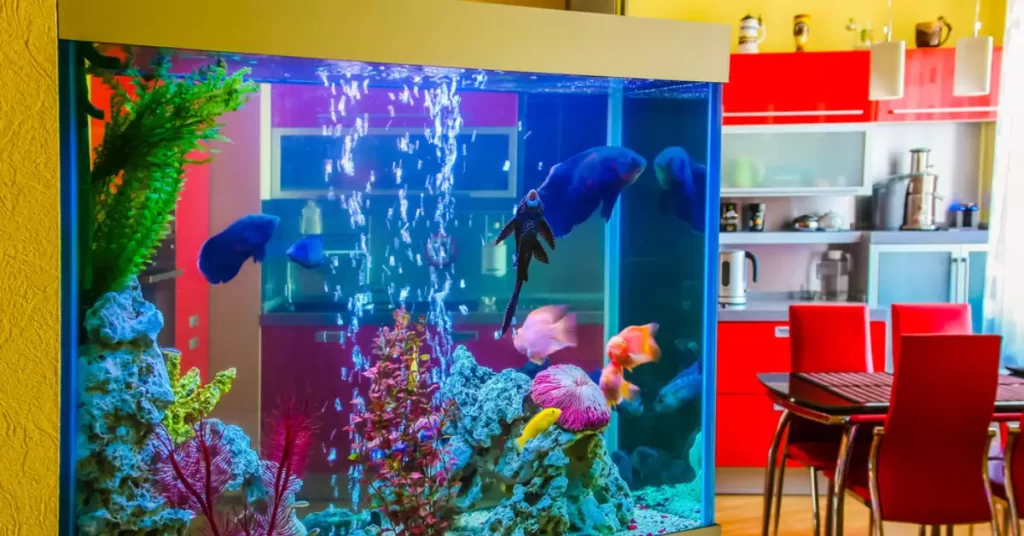Owning a pet is a great way to bring joy and companionship into your life, but what if you live in an apartment? Fish tanks can be a popular choice for apartment dwellers due to their minimal space requirements and quiet nature.
In this article, we’ll dive deep into the world of fish tanks and apartments, exploring various factors that may affect whether you’re allowed to have a fish tank in your apartment, the benefits and drawbacks of owning one, and how to maintain a harmonious relationship with your landlord and neighbors.
Understanding Apartment Rules and Regulations
Lease Agreements and Pet Policies
Before investing in a fish tank, it’s important to review your apartment’s rules and regulations.
These are typically outlined in your lease agreement, which may include a pet policy that specifies whether or not pets, including fish, are allowed in the building.
Specific Rules for Fish Tanks
If your lease agreement does not mention fish tanks or aquariums explicitly, it’s best to reach out to your landlord for clarification. Some apartment complexes may have specific rules regarding fish tank size, weight, or location within the unit.
Benefits of Having a Fish Tank in an Apartment
Mental Health Benefits
Fish tanks offer numerous mental health benefits, including stress relief, relaxation, and a sense of accomplishment from maintaining a healthy aquatic environment.
Home Décor and Aesthetics
A well-maintained fish tank can also serve as an attractive focal point in your apartment, adding an element of beauty and serenity to your living space.
Potential Drawbacks and Concerns
Water Damage Risks
One significant concern for landlords and tenants alike is the potential for water damage caused by leaking or overflowing tanks. It’s essential to select a high-quality tank and maintain it properly to minimize this risk.
Noise and Odor
While fish tanks are generally quiet, some equipment like filters and air pumps can create noise that may disturb neighbors. Additionally, improper maintenance can lead to unpleasant odors.
Selecting the Right Fish Tank for Your Apartment
Size Considerations
Choose a fish tank that suits your apartment’s size and space constraints. Consider the tank’s dimensions, weight, and required equipment when making your decision.
Types of Fish Tanks
Research different types of fish tanks, such as freshwater, saltwater, and reef tanks, to determine which one best aligns with your interests, budget, and maintenance capabilities.

Maintaining a Fish Tank in an Apartment
Cleaning and Maintenance
Regular cleaning and maintenance are crucial to keeping your fish tank healthy and minimizing issues like algae growth and odor.
Proper Equipment and Supplies
Invest in high-quality equipment and supplies, such as filters, heaters, and water conditioners, to ensure the well-being of your fish and maintain a clean, odor-free environment.
Communicating with Your Landlord and Neighbors
Seeking Permission
Even if your lease agreement does not explicitly mention fish tanks, it’s a good idea to seek permission from your landlord before installing one.
This will help you maintain a positive relationship with them and avoid any potential issues down the line.
Addressing Concerns
If your neighbors have concerns about your fish tank, such as noise or odors, make an effort to address their concerns by adjusting your tank’s equipment or improving your maintenance routine.
Apartment Insurance and Fish Tanks
It’s essential to check your renter’s insurance policy to ensure that it covers potential water damage caused by a fish tank.
If it doesn’t, consider purchasing additional coverage or adjusting your policy to include this protection.
What to Do If Your Apartment Doesn’t Allow Fish Tanks
If your apartment does not permit fish tanks, you might consider alternative options like:
- Opting for a smaller, low-maintenance fish bowl.
- Exploring other low-maintenance pets, such as reptiles or birds.
- Joining local aquarium clubs or volunteering at public aquariums to pursue your interest in aquatic life.
FAQs
How can I prevent water damage from the fish tank in my apartment?
Regular maintenance, including checking for leaks, using a sturdy stand, and placing a water-resistant mat under the tank, can help prevent water damage.
Are there any size restrictions for fish tanks in apartments?
Size restrictions depend on your apartment’s rules and regulations, as well as the structural capacity of your unit. Consult your landlord for specific guidelines.
Can I have a saltwater aquarium in my apartment?
Whether or not you can have a saltwater aquarium depends on your apartment’s rules and your ability to maintain the tank properly. Always consult your landlord before setting up a saltwater aquarium.
Conclusion
Fish tanks can be a fantastic addition to an apartment, providing numerous mental health benefits and enhancing your living space’s aesthetics.
However, it’s essential to understand your apartment’s rules and regulations, communicate with your landlord and neighbors, and practice proper fish tank maintenance to ensure a harmonious coexistence.
By following the guidelines and tips provided in this article, you’ll be well on your way to enjoying a thriving aquatic environment in your apartment.